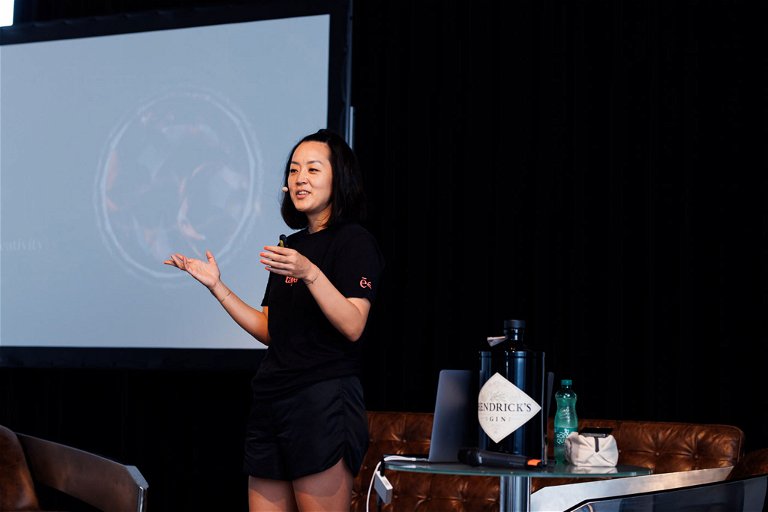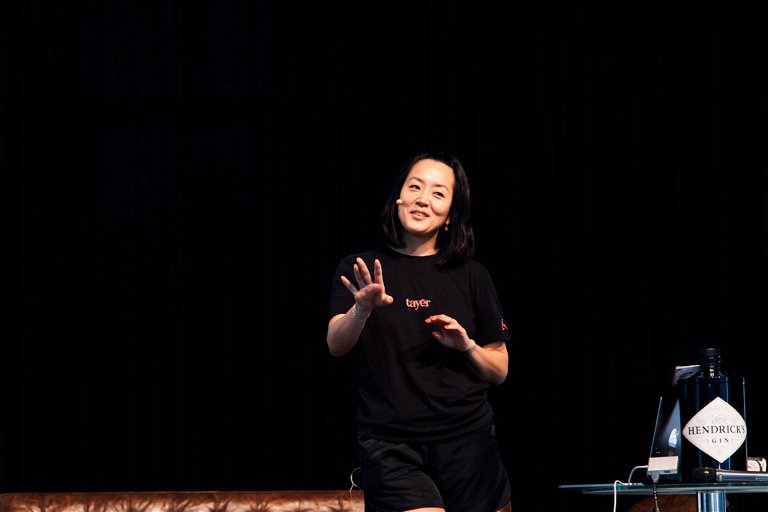Monica Berg: "The true instrument is you".
She has made it to the top of the bar world. In an interview with Falstaff the London bar icon talks about what needs to change in the industry, what advice she would give to young bartenders, and how to make the perfect sip of a cocktail.
"I've been told I'm the worst bartender in the world because I don't know how to throw bottles, I don't know how to freepour, I don't look like Tom Cruise.... you know the story," explains the woman on stage. She stands there quite relaxed, her hair loosely tied up, wearing shorts and a black T-shirt with a small pink logo. "Tayēr" is written there.
If you don't know the story above, you would hardly suspect that one of the best female bartenders in the world by far is behind this completely unpretentious and fundamentally likeable person. It is none other than Monica Berg, who is giving a masterclass at the Vienna "Liquid Market" at the invitation of colleague and "Hendrick's brand ambassador" Katharina Schwaller, which is as exclusive as it is inspiring.
Everything has its price
In 2019, the native Norwegian landed with her concept bar "Tayēr + Elementary", which she opened together with partner Alex Kratena."She was ranked number five in the "World's 50 Best" without any detours, only to secure second place less than two years later, a position she defends to this day. She received the "Altos Bartenders' Bartender" Award, became "International Bartender of The Year" and with her initiatives "P(our)" and "Back of House" is committed to sustainable changes and education in the bar scene.
You might think Berg would have lost her footing after that career high, but what drives her is at the core of everything. Especially, of course, when it comes to really good drinks. She prefers to work as minimalist as possible, putting the ingredients of her cocktails front and centre. Behind their counter, only what is in season and in its best possible shape at that time is processed. "You either pay with quality, you pay with money or you pay with time. Everything has its price, even if the currency may vary. I would never sacrifice quality," Berg explains in her master class. That starts, of course, with the spirits she uses, then moves on to fruits and sugar.
Everything has the same culinary value, for example, in a daiquiri, limes, sugar and rum are equal, even though you might use more rum. Lime is not all the same either, there are 20 different types of lime that we use in a bar, but maybe only ten that make a good daiquiri. You have to ask yourself questions like: where does this particular variety come from, why does it taste the way it does, and where did it grow?

The true instrument
To meet these demands, the menu in the "Tayēr" changes every single day, depending on what is available at the moment in perfect quality. All drinks are prebatched as much as possible and chilled to the perfect temperature. In the company itself, only what has been prepared in detail during the day is then served. "I don't like waiting for anything - so our vision is to serve inspiring and delicious drinks and food quickly," Berg continued.
The drinks themselves are meticulously combined and inspired by working methods and compositions that have their origins in perfumery. This is complemented by the "instinctive" and creative open process of the entire team, as Berg relates. Berg invests a lot of time, heart and soul not only in the preparation of her ingredients but also in the training of her employees, some of whom spend months in programs. In order for a drink to make it onto the "Tayēr" menu, it must be unanimously approved by the team. It fits the minimalist concept - if you do without anything unnecessary and put the best quality in the foreground, only what really counts remains: "No matter what tools you work with, the real instrument is yourself," says Berg.
Falstaff was allowed to meet Berg for an interview after the masterclass. On changes the industry desperately needs, how to actually get that famous "perfect sip," and golden advice for aspiring bartenders.
Say... Monica Berg
Falstaff: You were awarded the "Altos Bartenders Bartender" award by "World's 50 Best" in 2019, among numerous other recognitions. What has changed for you since then?
Monica Berg: Well, a lot has changed regardless of that, but the pandemic has had a very big impact. A lot of the events during Covid, the lockdowns and everything, have changed the way you look at the industry, what might be important and where or in what direction you want to take the industry and how you get there. Many things need to change, but it will take time and hard work. A lot of it has to do with education. We haven't necessarily made sure that we get the education we need to be able to speak for ourselves.
We need to be present at the table, at all the tables. We need to be present where rules are made, where laws are made, where policies are made, so that we can speak for ourselves and have a say in what is done. We have seen that while the hospitality industry contributes greatly to the economies of most countries, we are still not treated equally, nor do we get the protection we need. We opened ("Tayēr + Elementary," note) in 2019, just seven months before the first lockdown, and now I want to take a step back and focus on my bar. I want to be selfish and just enjoy working in the bar with my team and not worry about anything else. But at the same time, you see that you have to take care of other things so that you can enjoy working in the bar at all, otherwise it doesn't work.
What kind of trend do you see in mixology, in the beverage industry, but also in the industry itself?
I think there are many different movements. One of the really interesting and cool things is that there are more independent operators, there are more bartenders going all the way to open their own places. They are often places that are an extension of themselves, as our bar is for us. You can also see that the big fashion brands are now focusing more on food and beverage. "Dior" has opened this whole Riviera spa pop-up, "Jaquemus" as well. But you can also see that alcohol brands are starting to pay more attention to this side. It's a natural evolution, because for any brand, it's about connecting with people where they spend probably the most time.
There is the theory about the third space. You have work, home, and then places to spend your free time, whether it's a coffee shop, restaurant, library, or gym. You stay there because you want to, and of course the brands want to reach you there. I also believe that there is a general increase in knowledge and interest among the general population. People are more conscious of what they drink, they are more selective about what they drink. I think spirits categories like agave and even these smaller categories like fruit brandies, like calvados, will get more attention. And I also think the general focus on quality over quantity is a good thing. And of course the spritz. The spritz will never go away. But why should he?

They have launched the NGO "P(our)", which is about sharing knowledge, and the platform "Back of House", which deals with deeper issues in the industry. What do you think needs to change in the bartending industry?
What needs to change now will vary greatly from country to country. But from a UK perspective, the way people are employed and the way they are paid needs to change. The work that is done has value and people should be paid fairly and according to their performance and they should be protected. In general, in most countries and societies, the need and want for certain occupations are not rewarded financially in the same way. It's the same with teachers, nurses, all these professions.
Another point is that the industry needs to become more transparent so that people know they can have a really good career in hospitality. A well-paying career with lots of flexibility, lots of potential and lots of opportunities. You don't necessarily have to work only nights and evenings if you don't want to. We need a more systematic approach to knowledge and learning so that it becomes consistent. For example, many people don't even know that you can be taught to taste. Or how to cut things in a safe way, how to operate machines safely, how to do anything. And also compliance with all the regulations, all these things.
In "Tayēr + Elementary", you follow the "one-sip philosophy" - what does the perfect sip taste like?
This is a difficult question. I think the perfect sip, no matter what it is, has to meet expectations. If it is to be ice cold, it must be ice cold. If it is to be carbonated and bubbly, it must be carbonated and bubbly. So it has to meet expectations, but more importantly, it has to exceed them. When I expect a good sip and then it's great. It doesn't always have to be your favourite drink, either. Part of the taste journey should also be to challenge yourself.
What was the most impressive drink you ever tried?
One of the things that I tried that was very surprising, but also memorable, was a couple of years ago, probably in 2018, I would say. I don't remember exactly, but I was in Peru at a place called Tarapoto in the Amazon. We visited a Native community and tried something called "Masato" made from yuka, which is poisonous if eaten raw. So you have to ferment it to break it down. You chew it, then spit it into a bowl and add some flowers from a tree. It sounds horrible, but then that tastes like coconut. It almost looks like a big bowl of porridge. White and frothy on top. And you drink it and you pass it around and you take a sip and you expect it's not that great, but it was delicious and just also the experience of being there was great.
What advice would you give me as an aspiring bartender?
Work hard. Even though people say "fake it 'til you make it." I don't think that's good advice, because you should learn how to do it right first. There are no shortcuts. But you shouldn't be too hard on yourself either. Many people are very afraid of failure. But the only way to grow or get better is to make mistakes, because mistakes are the best way to learn. And don't rush to take responsibility. Just be selfish. Just go there and have fun. Be what you want to be. Later in life, you have enough responsibility.
Don't miss out!
Sign up now for our newsletter.

